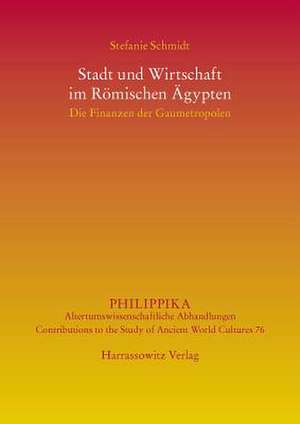Stadt Und Wirtschaft Im Romischen Agypten: Philippika, cartea 76
de Limba Germană Paperback
Din seria Philippika
- 14%
 Preț: 833.52 lei
Preț: 833.52 lei - 11%
 Preț: 567.28 lei
Preț: 567.28 lei - 11%
 Preț: 581.11 lei
Preț: 581.11 lei - 14%
 Preț: 778.58 lei
Preț: 778.58 lei -
 Preț: 389.49 lei
Preț: 389.49 lei -
 Preț: 446.69 lei
Preț: 446.69 lei -
 Preț: 293.90 lei
Preț: 293.90 lei - 19%
 Preț: 522.84 lei
Preț: 522.84 lei - 11%
 Preț: 477.44 lei
Preț: 477.44 lei -
 Preț: 411.89 lei
Preț: 411.89 lei -
 Preț: 318.32 lei
Preț: 318.32 lei - 11%
 Preț: 450.64 lei
Preț: 450.64 lei -
 Preț: 402.12 lei
Preț: 402.12 lei -
 Preț: 382.73 lei
Preț: 382.73 lei - 14%
 Preț: 621.79 lei
Preț: 621.79 lei - 14%
 Preț: 847.64 lei
Preț: 847.64 lei - 11%
 Preț: 459.12 lei
Preț: 459.12 lei - 11%
 Preț: 452.79 lei
Preț: 452.79 lei -
 Preț: 390.97 lei
Preț: 390.97 lei -
 Preț: 298.25 lei
Preț: 298.25 lei - 14%
 Preț: 680.93 lei
Preț: 680.93 lei - 14%
 Preț: 843.77 lei
Preț: 843.77 lei -
 Preț: 460.56 lei
Preț: 460.56 lei -
 Preț: 300.34 lei
Preț: 300.34 lei -
 Preț: 238.21 lei
Preț: 238.21 lei -
 Preț: 309.97 lei
Preț: 309.97 lei -
 Preț: 308.22 lei
Preț: 308.22 lei -
 Preț: 463.35 lei
Preț: 463.35 lei -
 Preț: 321.06 lei
Preț: 321.06 lei - 14%
 Preț: 646.61 lei
Preț: 646.61 lei -
 Preț: 240.54 lei
Preț: 240.54 lei -
 Preț: 363.76 lei
Preț: 363.76 lei - 11%
 Preț: 458.92 lei
Preț: 458.92 lei -
 Preț: 308.21 lei
Preț: 308.21 lei -
 Preț: 308.52 lei
Preț: 308.52 lei -
 Preț: 430.50 lei
Preț: 430.50 lei -
 Preț: 461.75 lei
Preț: 461.75 lei -
 Preț: 456.96 lei
Preț: 456.96 lei -
 Preț: 377.92 lei
Preț: 377.92 lei -
 Preț: 183.65 lei
Preț: 183.65 lei - 23%
 Preț: 869.65 lei
Preț: 869.65 lei -
 Preț: 236.36 lei
Preț: 236.36 lei -
 Preț: 333.66 lei
Preț: 333.66 lei - 19%
 Preț: 541.68 lei
Preț: 541.68 lei - 23%
 Preț: 530.82 lei
Preț: 530.82 lei -
 Preț: 394.97 lei
Preț: 394.97 lei - 11%
 Preț: 563.07 lei
Preț: 563.07 lei -
 Preț: 308.21 lei
Preț: 308.21 lei -
 Preț: 453.83 lei
Preț: 453.83 lei -
 Preț: 320.28 lei
Preț: 320.28 lei
Preț: 536.74 lei
Nou
Puncte Express: 805
Preț estimativ în valută:
102.74€ • 111.63$ • 86.36£
102.74€ • 111.63$ • 86.36£
Indisponibil temporar
Doresc să fiu notificat când acest titlu va fi disponibil:
Se trimite...
Preluare comenzi: 021 569.72.76
